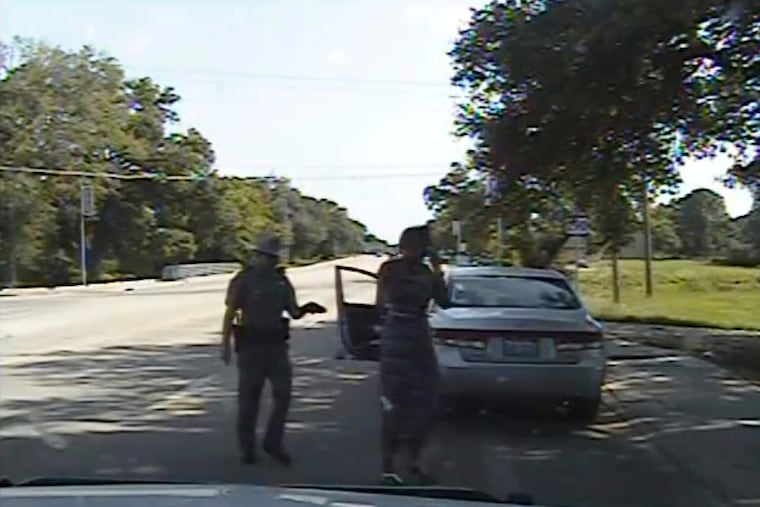Tensions flare in Texas Capitol over new Sandra Bland video
Texas authorities say they didn't withhold a 39-second cell-phone video taken by Sandra Bland during her confrontational traffic stop in 2015.

AUSTIN, Texas — Texas authorities on Friday denied withholding a cell-phone video of Sandra Bland’s confrontational traffic stop, responding to a Democratic legislator’s heated questions about why the 39-second clip never publicly surfaced until now.
Bland, a 28-year-old black woman from outside Chicago, had used her phone in 2015 to briefly film a white state trooper as he drew a stun gun and yelled "I will light you up!" while ordering her out of the car. She was dead three days later, hanging in her jail cell outside Houston. Her death was ruled a suicide.
"The Department of Public Safety has not illegally withheld evidence from Sandra Bland's family or her legal team," said Phillip Adkins, general counsel of the department.
The video had not been publicly seen until it was aired this month by a Dallas television station, and both lawmakers and Bland's family say they had also never seen the clip. They say the video proves that Trooper Brian Encinia had no reason to fear for his life and questioned whether he should have faced charges beyond perjury.
Democratic presidential contenders in the crowded 2020 field have also reacted to the video with calls for accountability and criminal justice reforms.
Explanations by state officials were challenged, often sharply, by Democratic State Rep. Garnet Coleman, who said he never received the video despite asking for all evidence as chairman of the House Committee on County Affairs. He told Adkins he was handed a jumbled “data dump” of four discs and said the description of Bland’s cell-phone video in the state’s investigative report wasn’t an honest account.
"I disagree with you. I think it's a fair and accurate description of the video," Adkins said.
Coleman interrupted, talking over him.
"You can disagree all day long, because I don't have lying eyes, sir," he said. "I've looked into this more than anyone."
Bland's mother, Geneva Reed-Veal of Chicago, attended the hearing at the Texas Capitol but did not testify. She told reporters afterward she heard "a lot of discrepancies" at the hearing but declined further comment.
Encinia, the trooper, was fired after being indicted for perjury and said he came to fear for his safety after stopping Bland for failing to signal a lane change. The perjury charge was later dropped in exchange for Encinia’s agreeing to never work in law enforcement again.
Coleman said Encinia "got off light" and accused state officials of not being ethically forthcoming with their handling of the video. Hours after the hearing, Texas DPS released a copy of a letter sent in October 2015 to the Bland's family attorney, Cannon Lambert, notifying him that a "cell phone download" of Bland's phone was enclosed on a thumb drive. Lambert said he never saw the video in the evidence that was turned over to him.
The hearing had been quickly arranged before the Texas Legislature adjourns Monday until 2021. One proposal that could still reach Gov. Greg Abbott's desk would make it more difficult to jail people for low-level misdemeanors, which some lawmakers have sought in the wake of Bland's death. Law enforcement groups, however, are fighting the measure.
In 2017, Coleman passed a "Sandra Bland Act" that included de-escalation training, independent investigations of county jail deaths and more racial profiling data. Advocates for criminal justice reforms have praised the changes, but the end product disappointed Bland's family, who felt it didn't address the circumstances leading up to her death.